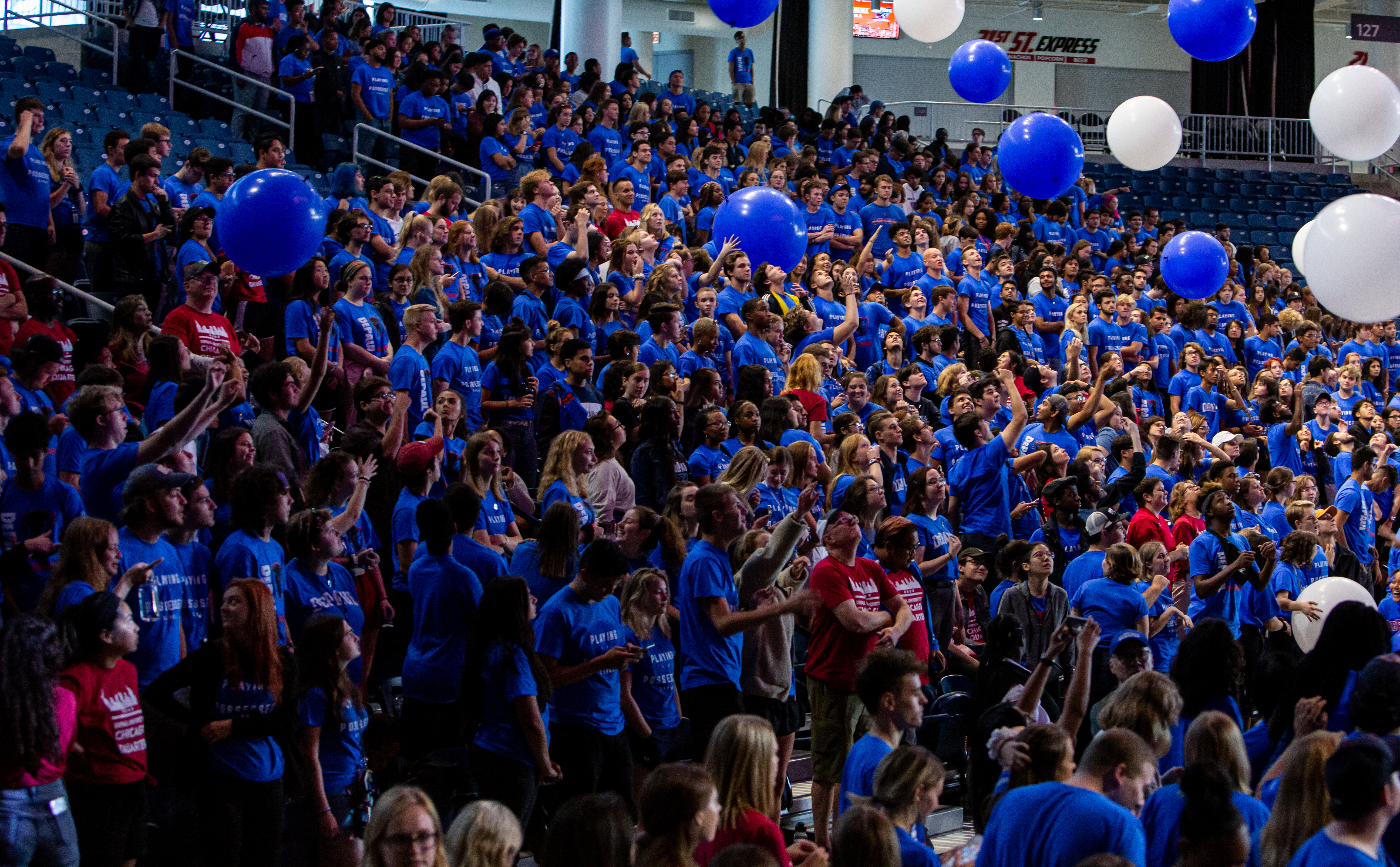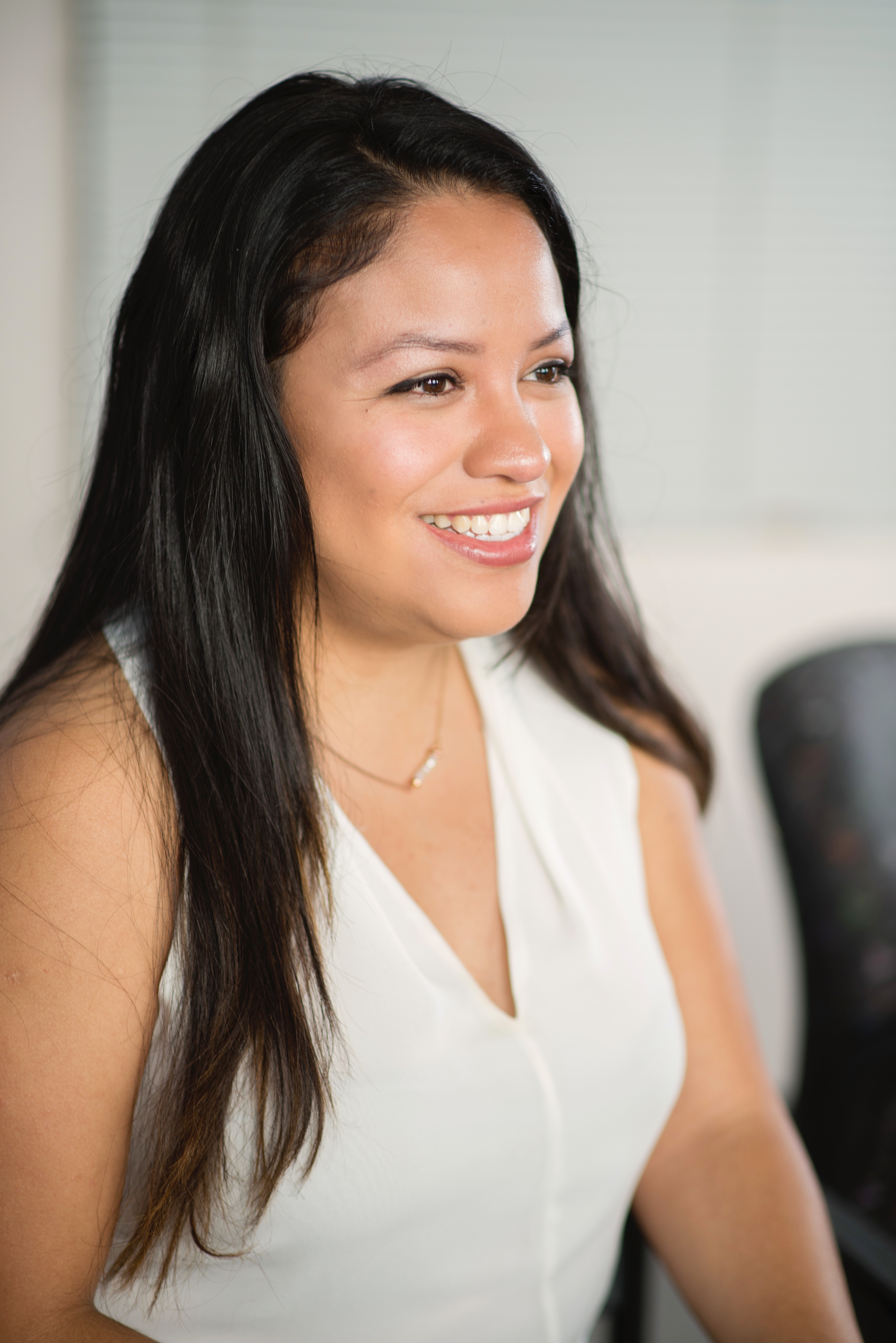 Last September’s Blue Demon Welcome in Wintrust Arena was one of the first opportunities for freshmen and transfer students to meet each other and their professors. (DePaul University/Randall Spriggs)
Last September’s Blue Demon Welcome in Wintrust Arena was one of the first opportunities for freshmen and transfer students to meet each other and their professors. (DePaul University/Randall Spriggs) Community psychology doctoral student Lidia Monjaras-Gaytan recalls her devastating freshman year as a first-generation Latinx college student, unsure how to navigate the world of higher education. She ended that year with a low GPA and was academically disqualified from continuing at San Diego State University.
“Although this experience negatively impacted my academic self-esteem, I enrolled in a community college with the goal of one day returning to SDSU," Monjaras-Gaytan says. "While in community college, I met faculty and staff who were instrumental to my success; they helped me navigate a system that was not created for people like me."
Monjaras-Gaytan successfully transferred and went on to earn a bachelor's degree in psychology from SDSU. Last year, she earned a master's degree in community psychology from DePaul. The invaluable support she received from mentors in college inspired her research interests in mentoring and underrepresented college students.
 Lidia Monjaras-Gaytan, a first-generation Latinx scholar, is a recent awardee of a three-year prestigious Ford Foundation Predoctoral Fellowship. (Photo courtesy of Lidia Monjaras-Gaytan)
Lidia Monjaras-Gaytan, a first-generation Latinx scholar, is a recent awardee of a three-year prestigious Ford Foundation Predoctoral Fellowship. (Photo courtesy of Lidia Monjaras-Gaytan)
One of those mentors is Bernadette Sánchez, a Vincent de Paul Professor of psychology. “Under the guidance of my advisor, Dr. Sánchez, I examined how natural mentoring relationships develop and the benefits of these relationships for adolescents," says Monjaras-Gaytan, who recently published her master's thesis titled “
Developing natural mentoring relationships among Latinx youth: the roles of trust in adults and stressors."
More than two years ago, Monjaras-Gaytan started working on the First-Generation College Student Study under the guidance of Ida Salusky, an assistant professor of clinical-community psychology.
“In this four-year study, I am examining the college experiences of first-generation students," she says. "Specifically, I will be using this data to explore what factors promote and inhibit students in developing mentoring relationships with university faculty and staff."
Earns Ford Foundation Predoctoral Fellowship
Monjaras-Gaytan recently received word that she is an awardee of a three-year prestigious Ford Foundation Predoctoral Fellowship. The competitive fellowship will allow her more time to write and publish, with the goal of becoming a tenure-track professor.
An email from the Ford Foundation reads, in part: “Your selection for this prestigious award reflects our review panelists' judgment of your scholarly competence as well as the promise that you show for future achievement as a scholar, researcher, and teacher in an institution of higher education."
Sánchez explains the goal of the Ford Foundation fellowship is to diversify the faculty in higher education.
“This opportunity will connect Lidia to a network of diverse scholars in academia who will share relevant opportunities, resources and tips on being successful academics," Sánchez says. “As a first-generation college student and woman of color, Lidia is and will continue to be a positive role model for other undergraduate students who see themselves in her. I am so proud of Lidia's hard work and persistence in earning this award."
Paying it forward
The invaluable support that Monjaras-Gaytan received from mentors in college inspired her to support the learning needs of her peers. Upon transferring to SDSU, she became an academic advisor for the psychology department.
"I wanted to share my story with students and provide support to those who also received academic probation and disqualification letters," she says.
She also tutored students from the Equal Opportunity Program, which serves students from underserved communities, in statistics and research methods, noting she understood what it was like to do poorly in classes without the adequate support.
As a doctoral student at DePaul, Monjaras-Gaytan has continued her engagement with undergraduate students as a mentor and instructor for the McNair Scholars Program, which supports underrepresented undergraduate students who are pursuing graduate degrees. She also mentors a number of Latinx undergraduate students at DePaul who volunteer as research assistants on her projects.
“I am not only able to relate to students about barriers they face in college, but also help them navigate these obstacles," she says.